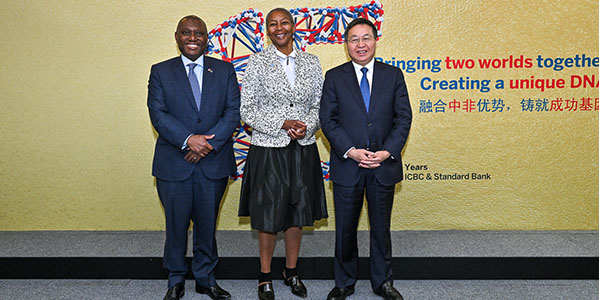
Standard Bank sponsors African Continental Free Trade Area Business Forum
Driving cross-border growth in Africa
The African Continental Free Trade Area (AfCFTA) is one of the African Union’s 13 flagship projects comprising its Agenda 2063 initiative aimed at unlocking Africa’s potential as a global economic powerhouse. Once implemented, the AfCFTA will be the world’s largest free trade area, uniting 54 of Africa’s 55 states and all eight of the continent’s regional economic associations in a partnership that aims to create a single continental market representing a population of about 1.3 billion and combined gross domestic product (GDP) of approximately US$ 3.4 trillion.
Standard Bank is a key partner of the African Continental Free Trade Area (AfCFTA) Business Forum taking place from 16 – 18 April 2023 at the Cape Town International Convention Centre.
As Africa’s largest bank by assets, present in 20 markets across sub-Saharan Africa and committed to driving Africa’s growth, “Standard Bank is building the finance and trade solutions to help address the tariff and non-tariff barriers required to realise the continent’s ambitions to create an effective single market,” says Philip Myburgh, Head of Trade for Business and Commercial Banking at Standard Bank.
A significant non-tariff barrier in Africa is, for example, access to information. In response, Standard Bank has developed the Africa Trade Barometer. Initial Africa Trade Barometer data highlighted the cost, risk and access to credit challenges as well as the international supply chain constraints facing businesses in Africa. Trade Barometer data also show a lack of awareness of the AfCFTA and persistent legislative, infrastructure and cross-border customs and logistics challenges. While Standard Bank is leveraging its infrastructure and group footprint to help African businesses access and participate in continental and global value chains “Standard Bank would also like to see this year’s AfCFTA Business Forum address tariff barrier reduction at the inter-government level,” says Myburgh.
Beyond aligning legislation and reducing red tape, however, “a conducive environment needs to be developed to empower Africa’s private sector to develop the manufacturing capabilities to beneficiate products and produce finished goods,” says Shaahien Mottiar, Executive Head: Trade and Working Capital Portfolio Management for Corporate and Investment Banking at Standard Bank. From a banking perspective this involves assisting Africans access trade finance by leveraging the ability of Africa’s financial institutions to deploy capital from development finance institutions and sovereigns into effective trade finance, especially for entities that have not yet built up their credit standing.
Moreover, given the dominance of the United States dollar (USD), creating a Pan African Payment and Settlement System or exploring Central Bank Digital Currencies and other alternatives could, “reduce complete reliance on the USD and improve Africa’s ability to grow intra-continental trade,” says Mottiar.
Other areas where banks and the private sector could work with the AfCFTA to begin implementation in 2023, is to identify and then co-operate on leveraging growth in high-potential sectors. In Africa, for example, agriculture is the bedrock, biggest earner, and greatest employer in many markets. Energy and power infrastructure is another area where even limited cross-border co-operation and co-ordinated national investment could have a disproportionally high impact on regional and continental growth. Free trade or special economic zones have also, to date, proved their worth as drivers of investment, production, and export earnings amongst African economies.
No contemporary discussion of African development and growth can exclude the critical role that China plays in trade, investment, infrastructure and, increasingly, manufacturing in Africa. Certainly, Standard Bank’s equity partnership with the Industrial and Commercial Bank of China has been, and will remain, a key element in “uniting the ability of the world’s second largest economy with what will become the biggest growth opportunity of the current century,” says Myburgh.
Importantly for Africa, and critically for the AfCFTA vision of a single African market, the continent’s booming digital ability supported by a youthful population in many instances leading the world in digital adoption, start-up formation and innovation, presents another avenue for “Standard Bank to provide the finance, guidance and digital platforms and connectivity to grow Africa’s digital revolution into a global investment proposition,” says Myburgh.
Either way, in a world of high inflation, supply chain challenges, the rising likelihood of ESG-related trade barriers and geo-political risks, the “AfCFTA’s case for a coordinated approach to development and growth has never been stronger or more urgent,” concludes Myburgh.


